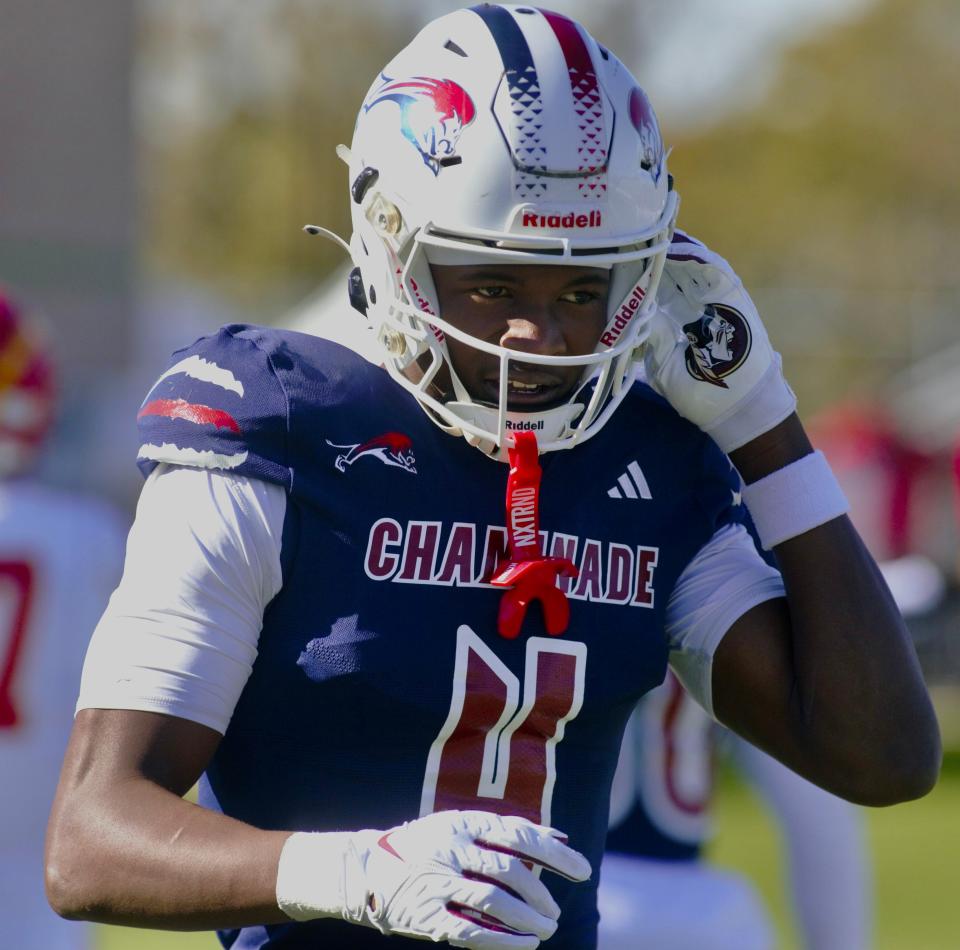Football: Will South Florida actually embrace Open Division after Metro/Suburban's demise?
Are we really getting an Open Division in Florida?
That was the initial premise behind the Florida High School Athletic Association board of directors vote that killed Metro and Suburban classes on Tuesday.
It’s no secret that many of the schools in South Florida were upset by the class split from the beginning. Publicly, the reasons for the outcry varied from it not being a true state championship unless South Florida was involved to shouts of the split being motivated by racism and not by competitive balance.
Quietly, and possibly more honestly, the frustrations for a lot of people in Broward and Miami-Dade counties boiled down to something much simpler: fewer state championships.
![Miami Columbus quarterback Alberto Mendoza (15) runs away from Mandarin linebacker Israel Ratliff (8) during the FHSAA Class 4M high school football championship game on December 8, 2023. [Clayton Freeman/Florida Times-Union]](https://s.yimg.com/ny/api/res/1.2/uKxHLs7kdXexSN6EOt4b1A--/YXBwaWQ9aGlnaGxhbmRlcjt3PTk2MDtoPTY1Mw--/https://media.zenfs.com/en/palm-beach-daily-news/1aaa3b89c15d397235106968690c2845)
FHSAA votes to scrap Metro/Suburban classifications for high school football
Santucci: Metro and Suburban classes are gone, let's hope great state title games aren't
Many South Florida teams were against Metro/Suburban classes
Why would South Florida teams be OK with a system that means fewer state championships for South Florida? Why would they be OK with a classification that placed perennial powers Central, Norland, Booker T. Washington, Northwestern, American Heritage and Cardinal Gibbons in the same class? Those schools combined to win 12 state titles from 2017-21 and now they would all be competing for one.
Did you really think they were going to like that while Suburban schools such as Lake Wales, Mainland, First Baptist and Cardinal Mooney won championships without having to beat a South Florida team?
Prior to the Metro and Suburban class split, the majority of state championships were won by South Florida schools. From 2013 to 2021, teams in Broward or Miami-Dade won 41 of 63 possible state titles. That’s 65% and that doesn’t factor in state runners-up (nine) or Dwyer, a Palm Beach County school, which won the Class 7A title in 2013.

South Florida is king and there’s no disputing that.
Arguing anything else would be sticking their head in the sand. Just as it would be ridiculous to argue that population density, open enrollment and rampant transfers haven’t played a role in many of the same teams remaining on top year after year.
This is the reality we live in, and we should expect to see a return to such results now that the board has voted to return to seven classes plus one rural division.
Now, back to the Open Division.
Will South Florida teams quietly oppose an Open Division?
It was promoted as an elite postseason bracket that would produce one champion with bragging rights. Eight teams, almost certainly half or more of which would come from South Florida annually, would compete for one title.
Fans would love the bragging rights. The media would heartily promote an eight-team free-for-all to end the annual "what if" debate.

But does this sound like something South Florida wants?
They kicked and screamed for two years about a system that put a lot of elite teams in one bracket for one title. Now they’re going to embrace it?
Let’s be realistic for a second. No school in its right mind publicly is going to disagree with the Open Division. Who wants to be seen as ducking a fight? Elite teams should embrace this.
Some would.
Look at the non-district schedules teams like Chaminade-Madonna, Central and Norland played this year. They weren’t ducking anyone. Central coach Jube Joseph spoke openly about embracing a schedule that allowed them to compete for a national title. But there are other programs that have earned the reputation of doing the exact opposite — constructing a schedule with winnable games to build a gaudy record.
Is South Florida really going to be in favor of an Open Division?
And if they’re not, are they going to be OK with the board voting for it?
Tuesday’s meeting already is seen by some around the state as a Trojan horse. The Open Division was a misdirection to push through the old class system. A return to balance for South Florida. The board didn’t even vote on an Open Division on Tuesday. The crown jewel of the proposal has been put on a shelf to be considered at a later date.
Some of that makes sense. The most pressing concern is figuring out the districts and classes. The postseason can be figured out later.
But the original question is worth repeating.
Are we really getting an Open Division in Florida?
Jon Santucci is the senior high school football recruiting reporter for the USA Today Florida Network. He can be reached at jsantucci@gannett.com.
This article originally appeared on Treasure Coast Newspapers: Will South Florida high school football teams embrace an Open Division?


